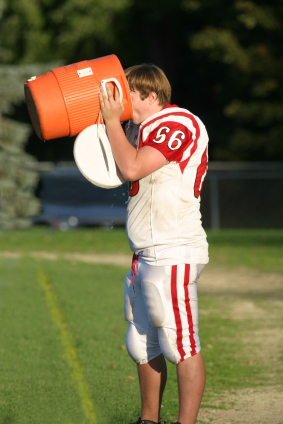A new article in the New York Times quotes Kevin Miller, an associate professor of athletic training at Central Michigan University and MomsTEAM contributor as saying that "'best advice' about how to keep young athletes healthy during warm-weather practices 'is common sense.'"
"Don't urge athletes to drink if they aren't thirsty. And don't make them keep playing if they aren't feeling well," he says. Miller's concern is that coaches and parents who press young athletes to drink fluids before, during, and after a practice, whether the athletes feel thirsty or not, may be putting young athletes at risk of drinking too much water, which can result in a dangerous, life-threatening condition called hyponatremia.

We wondered what other experts felt about the article's advice, so we asked three of our go-to hydration experts, Dr. Susan Yeargin, a professor at the University of South Carolina, Dr. Doug Casa, Executive Director of the Korey Stringer Institute and professor of kinesiology at the University of Connecticut, and sports nutritionist and MomsTEAM expert, Nancy Clark, for their thoughts. Here's what they said:
- Dr. Casa didn't think the article did a good job of properly explaining hydration, dehydration, heat illness and hyponatremia: "Hydration is extremely important during intense exercise in the heat, it can be very protective at keeping body temp down in these circumstances. The story did not really get into this at all." Dr. Casa believed that "We have to continue to work hard to educate about proper hydration - not enough causes problems and compromises performance, too much causes problems and compromises performance. It takes some education to help athletes find the sweet spot. Hyponatremia and heat stroke are two of the most important conditions to be concerned about during sport, and hydration plays a role in both. For a recreational athlete doing low intensity activity the risk of hyponatremia [from drinking too many fluids] is much greater. For a very serious athlete doing intense activity in the heat the risk of heat stroke is much greater. The other 90% of situations pose a risk of both - and hence the need to properly hydrate."
- Dr. Yeargin thought the article, in stating that coaches and parents, by encouraging athletes to drink on a schedule before, during, and after sports, were encouraging them to over-drink, which is not what she has recommended in articles for MomsTEAM and more generally. "Encouraging children to drink versus children to over drink are two different things. The amounts we talk about them drinking before, during, and after sports are not anywhere close to the gallons that the athletes who died of hyponatremia drank. I have been careful to emphasize that the amount kids should drink should be 'as tolerated' or
'as needed' so that people don't misunderstand/misconstrue my recommendations." - Nancy Clark, who, like Dr. Yeargin, has written a number of articles on MomsTEAM on the subject of hyponatremia, told MomsTEAM that, she agreed with the article to the extent it recommended using common sense. "The body does an amazing job of talking to us -- we just need to listen," Clark said. "Some athletes fail to listen and drink too much (until they slosh) or too little (despite thirst)." Clark did add that she thought that "educating heavy sweaters to learn their sweat rate (with pre- and post-training weigh-ins) can he useful information, and let them know how well they manage to hydrate themselves when left to their own instincts."
Posted August 28, 2015








